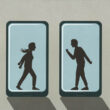If you’re in a relationship, it’s natural to feel attached to your partner. After all, you love spending time together and enjoying each other’s company. But is it bad to be attached to your boyfriend?
The answer is not as straightforward as you might think. While attachment can be a sign of a healthy relationship, there’s a fine line between healthy attachment and unhealthy dependence.
When you’re attached to your boyfriend, you might feel like you can’t live without him. You might want to spend all your free time together and feel anxious or upset when you’re apart.
These are all normal feelings, but they can become problematic if they start to interfere with your daily life. If you find yourself neglecting your friends, family, or hobbies because you’re so focused on your boyfriend, it might be time to take a step back and reevaluate your priorities.
It’s important to remember that being attached to your boyfriend doesn’t mean you’re weak or needy. It’s natural to want to feel close to the person you love, and attachment can be a sign of a strong emotional bond.
However, if your attachment is causing you distress or making it difficult to function in other areas of your life, it might be time to seek help.
With the right support, you can learn to strike a healthy balance between attachment and independence and build a strong, fulfilling relationship with your boyfriend.
What is Attachment?
Attachment is a deep emotional bond that forms between two people, often a romantic couple.
It is a natural human instinct to seek out connection and closeness with others, and attachment is a way to satisfy that need for connection.
When you are attached to your boyfriend, it means that you have a strong emotional connection to him, and you feel a sense of security and comfort when you are with him.
Attachment can be a positive thing, as it can bring a lot of happiness and fulfillment to your life.
Nevertheless, attachment can also become unhealthy if it is based on insecurity or fear of being alone. In these cases, attachment can lead to codependency, jealousy, and other negative emotions that can harm your relationship.
There are different types of attachment styles, including secure attachment, anxious attachment, dismissive-avoidant attachment, and fearful-avoidant attachment.
Each attachment style is characterized by different patterns of behavior, thoughts, and emotions in relationships. Understanding your own attachment style, as well as your boyfriend’s attachment style, can help you navigate your relationship more effectively.
Pros and Cons of Being Attached to Your Boyfriend
Now we will discuss the pros and cons of being attached to your boyfriend.
Pros of Being Attached
Being attached to your boyfriend can have its benefits. It can provide a sense of security and comfort, knowing that you have someone you can rely on.
When you’re attached to your boyfriend, you may feel more motivated to work on the relationship and strengthen it. This can lead to a deeper emotional connection and a more fulfilling relationship.
Additionally, being attached to your boyfriend can help you feel happier and more fulfilled in your life. When you have someone to share your life with, it can make the good times even better and help you get through the tough times.
Cons of Being Attached
While being attached to your boyfriend can have its benefits, there are also some potential downsides.
One of the biggest cons of being attached is that it can lead to codependency. When you’re too attached to your boyfriend, you may rely on them too much for your happiness and well-being. This can put a strain on the relationship and make it difficult to maintain a healthy balance.
Another potential downside of being attached is that it can make it difficult to maintain your own identity and independence. When you’re too focused on your relationship, you may neglect other important aspects of your life, such as your career, hobbies, and friendships.
Finally, being too attached to your boyfriend can make it difficult to handle a breakup. If the relationship ends, it can be devastating and leave you feeling lost and alone.
Signs of Unhealthy Attachment
Attachment is a natural part of any relationship, but it can negatively impact your life when it becomes unhealthy. Here are some signs of unhealthy attachment:
Jealousy and Possessiveness
When you are in an unhealthy attachment, jealousy, and possessiveness can become major issues. You may feel like you need to control your partner’s every move or become upset when they spend time with other people. This type of behavior can be toxic and can lead to a breakdown in communication and trust.
If you find yourself constantly checking your partner’s phone, and social media accounts or asking them about their whereabouts, it may be a sign that you are struggling with jealousy and possessiveness. It’s important to recognize these behaviors and work on addressing them in a healthy way.
Isolation from Friends and Family
Another sign of an unhealthy attachment is when you start to isolate yourself from your friends and family. You may feel like you only want to spend time with your partner and neglect other important relationships in your life.
This type of behavior can be damaging to your mental health and can lead to feelings of loneliness and isolation. It’s important to maintain a healthy balance between your relationship and other important relationships in your life.
Lack of Independence
You may become overly dependent on your partner when you are in an unhealthy attachment. You may feel like you need them to be happy or that you can’t function without them. This type of behavior can be dangerous and can lead to feelings of anxiety and depression.
It’s important to maintain your independence in a relationship. This means having your own hobbies, interests, and friends outside of your relationship. It’s healthy to have some time apart from your partner and to pursue your own interests and goals.
How to Develop a Healthy Attachment With Your Boyfriend
Developing a healthy attachment with your boyfriend is important for a happy and fulfilling relationship. Here are some tips to help you develop a healthy attachment:
Communication
Communication is key in any relationship. Make sure you are communicating openly and honestly with your boyfriend.
This means expressing your feelings, needs, and desires, as well as listening to your boyfriend’s feelings, needs, and desires. When you communicate effectively, you can build a deeper connection with your boyfriend and strengthen your attachment.
Trust and Respect
Trust and respect are essential components of a healthy attachment. Trust your boyfriend and give him the benefit of the doubt.
Respect his opinions and decisions, even if you don’t always agree with them. When you trust and respect each other, you can build a strong foundation for your relationship.
Maintaining Independence
While it’s important to build a strong attachment with your boyfriend, it’s also important to maintain your independence. This involves having your own hobbies, interests, and friends outside of your relationship.
When you maintain your independence, you can bring new experiences and perspectives to your relationship, which can help keep it fresh and exciting.
By following these tips, you can develop a healthy attachment with your boyfriend that will help your relationship thrive.
In Summary
Being attached to your boyfriend can be a natural and healthy part of a relationship. It’s important to feel close to your partner and to enjoy spending time together. However, maintaining independence is also important and not letting your attachment become too intense.
If you find yourself constantly needing to be with your boyfriend or feeling anxious when you’re apart, it may be a sign that your attachment has become unhealthy. This can lead to problems in your other relationships and in your own personal growth.
Remember to prioritize your own needs and interests, as well as your boyfriend’s. Make time for your friends and family, pursue your own hobbies and interests, and don’t be afraid to spend time apart from your boyfriend.
If you’re struggling with attachment issues, consider seeking the help of a therapist or counselor. They can provide tools and strategies for managing emotions and building healthier relationships.
YOU SHOULD ALSO READ:









